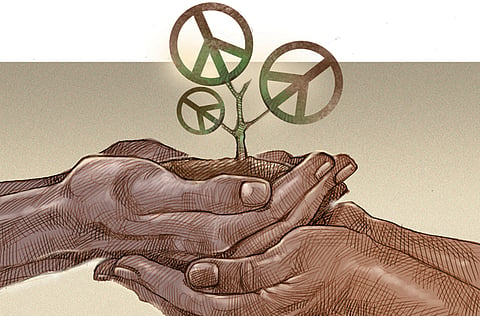Hard-won hope turns to ashes in South Sudan
Much can be washed away by history, but the stain of ethnic cleansing stays

By the end of this year, half of South Sudan’s 12 million people will either be in flight, facing starvation or dead. That was the shocking but all too real prognosis presented to me upon arrival last Tuesday in Juba, the nation’s capital.
Over the last five months, this newest of nations, and one of the world’s poorest, has been plunged into a maelstrom of violence that has displaced more than 1.2 million people and raised the spectre of ethnic cleansing. With more than four million already desperately hungry and fields lying empty because people are too afraid to plant or tend to their crops, the country faces the threat of famine. It is a perfect storm of man-made calamity.
Kiir and Machar have a moral and political responsibility to lead South Sudan away from the brink of disaster. This was never supposed to be the story. Less than three years ago, I was in Juba to celebrate the country’s hard-won independence. It was a time of joy. The people were united and hopeful for a better future. The country had overwhelming international support. On that day, I shared President Salva Kiir’s pride, for the United Nations had played a significant role in South Sudan’s birth. Soon afterwards, I joined Vice-President Riek Machar in New York to witness the raising of the flag of South Sudan as the 193rd United Nations member state.
These two men have become bitter foes since Machar and other members of the cabinet linked to him were dismissed by Kiir last summer. The subsequent power-struggle has swiftly taken on dangerous ethnic dimensions. All over South Sudan, people have witnessed and endured terrible atrocities committed by supporters of both factions. In fear for their lives, about 85,000 men, women and children have sought refuge under the blue UN flag at the bases of the UN peacekeeping operation. More than 10 times that number have simply fled their homes, with nowhere to go.
My first stop in Juba last week was a site for internally displaced persons in the Tomping compound of the UN Mission in South Sudan. The people there are mostly Nuer, members of Machar’s ethnic group. Elsewhere in the nation, the UN mission is protecting Dinka, Kiir’s community — equally fearful, equally vulnerable. The UN policy of opening its gates to protect innocent civilians — when all other options have failed — is correct, unprecedented and not without considerable risk: To the UN staff members, to their relations with communities and to those we are trying to shelter. It is not a decision the UN took lightly, but one the UN was morally compelled to take. The quick response and courage of UN peacekeepers and civilian staff have saved tens of thousands of lives. But as journalists and humanitarian workers have reported — and I have seen for myself — conditions for those under UN protection are dire, despite the UN’s best efforts. The UN facilities were never designed for a massive influx of refugees, nor should they have been. Now the rainy season has arrived, bringing new dangers. The UN mission is working hard to set up new, more hygienic camps, but what South Sudan needs, first and foremost, is peace.
That was the clear message I heard from all the people I met at the Tomping site. A young Nuer woman, who has been in the camp with 15 members of her family since December, simply said: “We hope peace will prevail. We want our leaders to accept peace.” This was what I told Kiir and Machar. Both men responded to the international community’s call to meet last Friday in Ethiopia under the auspices of the regional effort being led by the Intergovernmental Authority on Development. I am encouraged that they have signed an agreement to steer the nation towards peace. The onus is now firmly on both leaders to deliver. Kiir and Machar have a moral and political responsibility to lead South Sudan away from the brink of disaster. I told them they must show restraint, wisdom and compassion. They must stop the spiral of violence and, instead, think of their people and their legacy. Much can be washed away by history, but the stain of ethnic cleansing never fades.
The international community also has a major role to play. The UN Security Council must keep up the pressure on both sides to agree to a peace plan and address the root causes of the conflict. In particular, the UN needs 30 days of tranquillity — now. People need to be able to plant for the next harvest. I am encouraged that the government has announced that it supports this cessation of hostilities. Rebel groups must back it too. Both parties to the conflict need to guarantee humanitarian access. The UN is launching a huge operation to help 3.2 million people, but we need to be able to reach them — by air, road and, in particular, by barge along the Nile. Donor countries must step up their support. Despite the volatile situation, UN agencies and partners have remained in place. The infrastructure for assistance exists, but the humanitarian community is $781 million (Dh2.87 billion) short of the $1.27 billion that is needed by the middle of this year. I urge all countries to support the May 20 donor conference on South Sudan being hosted by Norway and the UN.
Finally, we must not lose sight of the fundamentals of human rights and accountability. Gunmen on both sides are guilty of rape, massacre and the recruitment of child soldiers. They and their commanders must face justice. South Sudan has fallen far and fast in a few short months. Let us work with speed to revive this ailing nation before it is too late.
— Los Angeles Times



